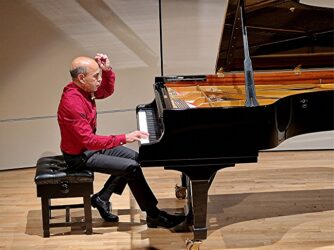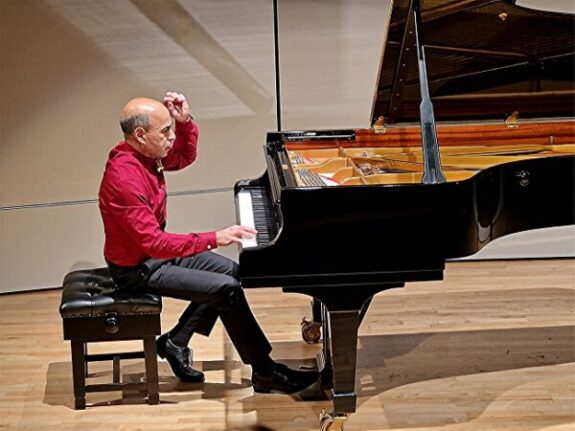 United Kingdom Romantic Piano: Robert Taub (piano). Levinsky Hall, University of Plymouth, 15.10.2022. (PRB)
United Kingdom Romantic Piano: Robert Taub (piano). Levinsky Hall, University of Plymouth, 15.10.2022. (PRB)

Beethoven – Sonata in C minor, Op.13 Pathétique
Robert Schumann – Davidsbündlertänze, Op.6
Chopin – Sonata in B minor, Op.58
American concert pianist and academic Dr Robert Taub took over the role of Music Director of the University of Plymouth’s Arts Institute in Spring 2018. In just over four years, and despite all the trials and tribulations of the pandemic and its imposed lockdowns, he initiated the highly acclaimed Musica Viva Concert Series. This programme of concerts and associated workshops involving fellow artists brings top-level performances and educational spin-offs to communities in the city and its environs in Devon and Cornwall.
The undisputed home for Music Viva concerts and many similar recitals had been the Sherwell Centre. Originally fashioned from Sherwell Church, it was transformed into a suite of lecture theatres by day. The upper one – which benefitted from retaining the church’s original roof, with all the acoustic advantages this offered – doubled up as a bespoke venue for music of chamber proportions. Eminent British pianist John Lill, commissioned to select a suitable Steinway Grand Piano, settled on the superb Model C.
The viability of this dual purpose has always tended to linger in the background somewhat. Taub set about finding an on-campus alternative. Prior to this inaugural concert, he announced that future concerts would take place in the newly named Levinsky Hal, previously Lecture Theatre One in the iconic eponymous building close by. The space has been upgraded with new on-stage adjustable sound panels and associated acoustic tweaks and will be a new home for the piano.
It has become a tradition in Musica Viva concerts that the performance is preceded by a half-hour informal chat with the performer(s). That is of immense interest not only to well-seasoned aficionados, but to first-time concertgoers, to whom the large student population contributes.
Taub finished his talk, left the stage for a while to regroup, returned to the platform, took his obligatory bow, and was about to sit down and start the highly dramatic opening of Pathétique. He was suddenly interrupted by a stentorian voice from the back of the auditorium asking him to stop. Apparently, the university had received a communication with the potentially devastating news that the piano was harbouring some kind of bomb. I am sure that Taub, like the rest of us present, thought that this might be some kind of set-up. Taub asked whether the piano could be checked out first. After all, there are few places to hide anything too obvious. His request was summarily denied, and, in strict accordance with university security protocols, everyone had to leave the building and assemble outside – where it had conveniently just started to rain heavily.
All credit to the security team on duty: the waiting audience was ushered into a nearby building, while vital checks were made elsewhere. Eventually the all-clear was given, and the audience was escorted back into the hall to recommence the recital. It eventually transpired that a young person in the auditorium had sent a presumably private message about a bomb to a nearby friend, but, with the wonders of Bluetooth, this was also received on a number of similar mobile phones in the vicinity, and that prompted the full evacuation protocol. My understanding is that the young person had been ‘spoken to’ by the appropriate authorities.
Some professionals justifiably might have felt unable to continue – from the emotional standpoint (to say nothing of cold hands). But Taub, particularly known for his Beethoven interpretations, is made of far sterner stuff. He clearly shares some of the composer’s defiant nature, so not only did he choose to continue the recital in full, but even finished with two significant encores, the second of which was Liszt’s immensely challenging La Campanella. In my book, that really shows a great strength of character, tenacity and the desire not to disappoint the packed audience.
Back at the piano, Taub had the extremely demanding task of beginning the slow introduction to the Pathétique. It might be just a single chord, but Beethoven requires it to be played fp (forte piano): commenced strongly then rapidly dying down to a soft dynamic. At this juncture, it is worth commenting on Taub’s fascinating programme notes, where, as in the above example, he explains in great detail what effects he is aiming for, and exactly how he sets out to achieve them. This is really enlightening even for the well-seasoned pianists in the audience. But to do this after all that had gone before was a truly magical moment, as it came off so perfectly. The rest of the opening Allegro molto was never short on drama and revealed much about Taub’s individual take on the movement.
Musicians are not machines, and just cannot be started up or turned off on demand; if they were, they would not be worth listening to. Beethoven himself nicely summed this up: ‘to play a wrong note is insignificant; to play without passion is inexcusable!’ Bob Taub is a highly sensitive musician, and I would be very surprised if the unfortunate start did not cause some degree of post-traumatic stress, however little this might have been sensed in the performance.
Moving on to the slow movement, Taub got the essential balance between accompaniment and soaring lyrical melody on top just right. His interpretation of the finale clearly reinforced his own perception of the movement as more restrained than tempestuous as is the opening Allegro molto.
According to the programme note, Schumann wrote the following about his Davidsbündlertänze to his fiancée Clara Wieck: ‘[It] is to Carnaval as a face is to a mask.’ His arguably better-known Carnaval – a set of twenty-one short character pieces – is, I feel, more immediately appealing than the eighteen pieces of Davidsbündlertänze that appeared two or so years later. The writing here is highly imaginative and personal. I almost feel that it might benefit from a second playing, in order to address the psychological implications of each piece more fully. Carnaval, on the other hand, always manages to appeal on its very first encounter. But Taub’s scholarly and emotionally charged performance still brought the eighteen miniatures very much to life.
It was now decided to extend the originally planned brief interval by bringing forward the after-concert reception, and so avoid a late finish. That made for another extended break before Taub could start the evening’s closing work, Chopin’s glorious Sonata No.3 in B minor. The score has the eminent beauty and romanticism, but the form in which Chopin casts each movement looks back more to the Classical period than ahead to Liszt’s epic one-movement sonata that appeared some ten years or so later. While each movement had its moments, for me the highlight was the slow Largo, where I felt that Taub was absolutely at one with the spirit and high-octane emotional content of Chopin’s writing: some ten minutes of pure Romanticism, at the heart of the composer’s final piano sonata.
I wish to comment on the Steinway Model C’s relocation to the Levinsky Building. I got an excellent view of the instrument, and I was in prime position to appreciate the sound. But for the first time ever the instrument sounded to me vaguely under-powered. It seemed to be struggling to produce the quality of tone, dynamic nuances and range that I had always appreciated from a similar vantage point in its former location. There is only a difference of some 47 cm or 18½ inches between the Model C and the full-size Model D concert grand, but on this occasion size really seemed to matter.
This was the first event in the hall where acoustic panels and other tweaks have been integrated. There has to be a period of fine-tuning and adjustment, especially when the hall is full and the audience is dressed for late autumn. Indeed, at the start of the pre-recital talk, a member of the audience seated towards the back of the hall felt the need to call out to Taub to please speak up. It is easy to understand the frustration, particularly when short excerpts are played by way of clarification, but I felt there was a case for some kind of sound reinforcement for speech – especially when the subject matter was so interesting and informative. This concert was the first of its kind at the new venue, with its ‘new’ piano and acoustic accessories. I am sure that there will be tweaking and readjustment before the second event next month, which adds a violin to the mix.
For the moment I will close with a quote from Robert Taub: ‘Romantic Music speaks to our souls – eternally, directly’. Whatever hurdles and hindrances there might have been at this opening concert of Romantic Music, Taub’s words were as apposite as ever.
Philip R Buttall
